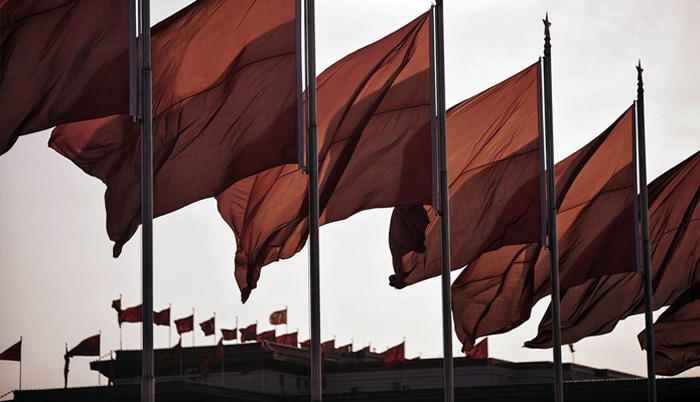![]() Home > World Business
Home > World Business
China's Restraint Two Decades Ago Heralded New Economic Order

Red flags fly at Tiananmen Square in Beijing, China on Wednesday, March 8, 2017. China's fifth session of the 12th National People's Congress (NPC) will close on March 15. Photographer: Qilai Shen/Bloomberg
![]() July 4th, 2017 | 09:41 AM |
July 4th, 2017 | 09:41 AM | ![]() 1386 views
1386 views
CHINA
When the financial crisis swept across Asia in the late 1990s, China took a decision that provided a crucial firewall. As currencies and stock markets around the region collapsed, the government in Beijing held the yuan steady.
It was a bold move for a nation that was relying on cheap exports to fuel its rapid economic development. To reinforce the message, top Chinese officials appeared on television, in newspapers and used speeches to ram home that the yuan wouldn’t be allowed to weaken.
The move ultimately helped stem contagion from the tumult in Indonesia, Malaysia, Thailand and South Korea. The alternative scenario, where China weakened its then-pegged yuan to keep its exports competitive, would have spurred deeper and more wide-spread devaluations.
"Everyone was nervous the Asian Crisis was going to escalate, so the fact that China held the exchange rate steady was a great source of stability for the region," said Paul Gruenwald, the chief Asia Pacific economist at S&P Global Ratings and a former official at the International Monetary Fund during the Asia crisis.
Not only that, China also offered more than $4 billion in financial aid, contrasting with an initial reluctance by America to get involved -- Bill Clinton famously described the chaos that was engulfing the region’s markets by November 1997 as a "few small glitches in the road".
Now, with the lens of history, these were early signals that a new global economic order was beginning to emerge. Today, that new order has arrived.
The world’s second-biggest economy and largest trading nation, China now commands a place at the top table of global finance that it could only have dreamed two decades earlier.
China has a much bigger say at the International Monetary Fund through more voting rights and high-level representation. The yuan has joined the IMF’s basket of reserve currencies, and a decision by MSCI Inc. to add Chinese stocks to their benchmark indexes last month was hailed as another landmark step. It has its own development bank, the Asian Infrastructure Investment Bank, and a web of foreign exchange lines with more than 30 central banks. And in the face of protectionist rhetoric stemming from Donald Trump, Chinese leaders are emerging as the new champions of globalization.
Globalization Champion
"That rallying cry has been picked up by other countries," IMF First Deputy Managing Director David Lipton told reporters in Beijing last month. "China as playing a very supportive role to our institution, and to the mission of our institution, which is cooperation in pursuit of growth and financial stability -- and global stability."
A vivid illustration of the yuan’s anchor role came in the summer of 2015, when a tweak to the fixing formula rattled global markets. Federal Reserve Chair Janet Yellen cited China as among reasons for delaying a rate increase later that year.
The resulting blow to confidence spurred capital outflows from China that forced authorities to reverse reforms and tighten up restrictions on the movement of money across borders. And so today, China in some ways finds itself in a similar position to where it was back in 1997 -- low foreign debt levels and capital constraints keep it insulated. The key difference: its now much, much bigger.
China’s dominance is most keenly felt in its own backyard. It’s now the biggest trading partner for the four Southeast Asian nations and South Korea who were worst hit by the crisis 20 years ago. In 1997, U.S. trade with the five nations was four times bigger than China’s. Today, China’s is twice as large.
"The role of China is even more critical now than twenty years ago," said Gruenwald
Source:
courtesy of BLOOMBERG
by Enda Curran
If you have any stories or news that you would like to share with the global online community, please feel free to share it with us by contacting us directly at [email protected]